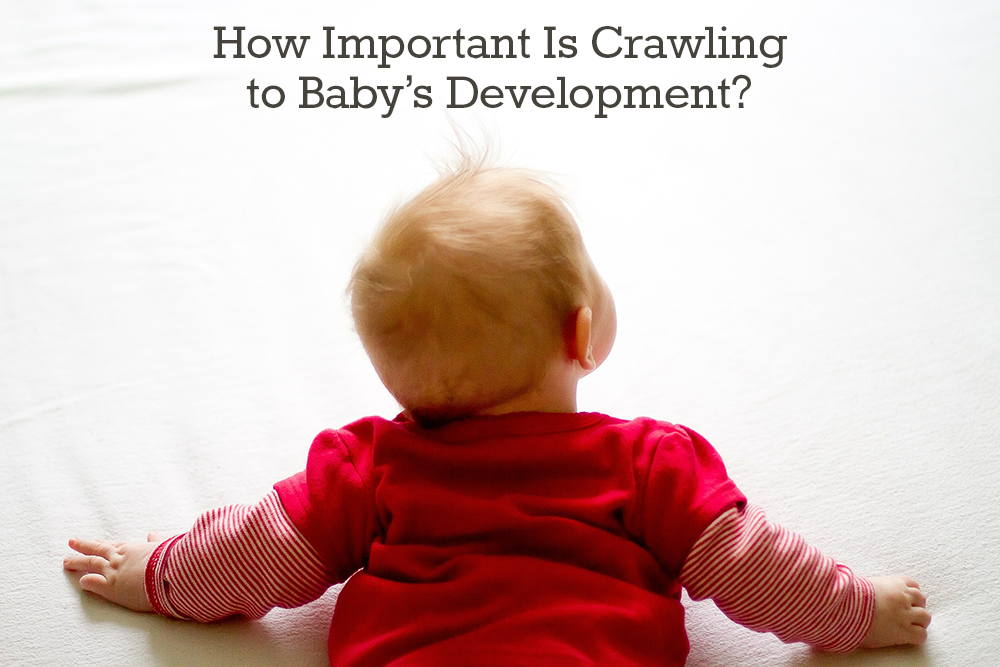Many parents whose children skip the crawling phase believe that their children are not only developing typically but are actually advanced. When parents report that their child has skipped crawling, the pediatrician may (or may not) indicate that it’s an issue.
So is it important for a child to crawl?
The short answer is yes, it is very important. A baby’s typical development that begins with laying and then proceeds to walking is called the “prone progression” and includes swaying from side to side (1-3 months), rolling partially over then sitting up (3-5 months), reaching while sitting and rolling over completely (5-7 months), crawling (7-9 months), pulling to stand and scooting back and forth (9-12 months), then walking (12-24 months). These ages in months are estimated ranges of when typical prone progression occurs. Each skill developed builds on each of the previous skills, and research is beginning to indicate that babies who skip crawling miss out on specific opportunities to build strength. A few of the benefits of crawling include:
Strength and Endurance: While crawling, a child places his body weight on his hands, arms, and legs. This weight bearing activity helps to develop strength and endurance which can lead to more stability and muscle development. Children who skip crawling may do so due to muscle weakness and limited endurance. Development of strength and endurance also leads to postural control, which helps to stabilize the core during fine motor tasks when the child is older – activities such as writing, manipulating small items, etc . Development of strength and endurance during crawling can also improve joint stability and control throughout the body.
Coordination: Crawling is a more complex motion to coordinate than walking because the upper and lower body have to work together. Both sides of the body have to coordinate to produce reciprocal motion. Difficulties with coordination may lead a child to skip crawling or choose a less conventional crawling method. Repetitive practice using this full body exercise can help develop coordination skills required for more complex motor tasks the child will engage in when she is older. Crawling also leads to improved balance and postural control during movement. Development of coordination also applies to visual skills such as eye-hand coordination, focusing distance, and visual tracking during movement, all of which are being developed during crawling.
Integration of Reflexes: Many therapists believe that crawling allows children to shift through patterns of movement which help integrate early reflexes. Research suggests that if primitive reflexes are not integrated a child can have difficulties with gross motor skills, overall muscle tone, coordination, and even visual skills.
What if your child hates crawling? Here are some ways to make crawling more fun and interesting for the child:
Toys: Find toys which motivate your child then place them on the floor around the child. Toys which are interactive, such as light-up toys and toys which play music, tend to be highly motivating.
Crawling With Your Child: Sometimes a parent’s face and voice can be the best motivation. Imitating the child with smiles and encouragement may help make ‘tummy time’ more enjoyable.
Sensory Experiences: Providing the child with different textures, lights, sights, sounds, smells, etc., during tummy time may help to both develop sensory processing and encourage exploration of her environment. Examples of sensory additions to tummy time may include placing the child in front of a mirror, laying the child down on rugs with varied textures, or having tummy time music playing.
Tummy Time Mats: Tummy time mats are available which provide motivating toys, interactive experiences, and overall enjoyment for babies. Make sure that tummy time mat toys are placed around the baby – not above – to encourage exploration and mobility.
Unfortunately, not all babies enjoy ‘tummy time’. If your baby typically cries throughout tummy time, talk with your pediatrician to first rule out any medical conditions – such as reflux – which may make laying on his stomach uncomfortable. Some babies will cry during tummy time due to weakness or lack of coordination, but it’s important to stick with it because tummy time and crawling help to develop strength and coordination. Physical therapists and occupational therapists are great resources for parents of children who appear to be skipping the crawling phase, and they can make a personalized plan, including practice suggestions for you and your child, to encourage typical development.
Carolyn Miller, MSOT, OTR/L
Image Courtesy Pixabay








